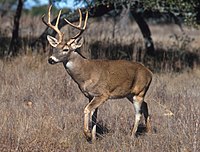
Photo from wikipedia
Abstract Systena frontalis (F.) is a major insect pest of nursery production systems in the Midwest and Northeastern regions of the United States with the adults feeding on plant leaves,… Click to show full abstract
Abstract Systena frontalis (F.) is a major insect pest of nursery production systems in the Midwest and Northeastern regions of the United States with the adults feeding on plant leaves, which reduces salability. However, there is conflicting information on overwintering, and no information on host-plant selection or insecticide susceptibility of S. frontalis adults. Therefore, we conducted a series of experiments under greenhouse, laboratory, and field conditions from 2015 to 2019. The overwintering experiment was isolated in a greenhouse to assess adult emergence from growing medium of containerized plants collected from a wholesale nursery. We found that S. frontalis overwinters in growing medium based on adults captured on yellow sticky cards and the presence of adults on new plant growth. Host-plant selection experiments were conducted at the wholesale nursery and under laboratory conditions to determine feeding selection based on S. frontalis adult feeding damage on whole plants using a foliar damage ranking scale for different cultivars of Itea virginica L., Hydrangea paniculata Siebold, Weigela florida (Bunge), and Cornus sericea L., plants. We found that S. frontalis adults exhibited no preference for the leaves of the plant species or cultivars tested in the field or laboratory. Insecticide efficacy experiments were conducted under field and laboratory conditions. In the field experiments, the insecticides acetamiprid, dinotefuran, and Isaria fumosorosea (Wize) (Hypocreales: Clavicipitaceae) provided better protection of plants from S. frontalis adult feeding than the untreated check. In the laboratory experiments, the acetamiprid and pyrethrins with canola oil treatments provided the highest percent S. frontalis adult mortality.
Journal Title: Journal of Economic Entomology
Year Published: 2020
Link to full text (if available)
Share on Social Media: Sign Up to like & get
recommendations!